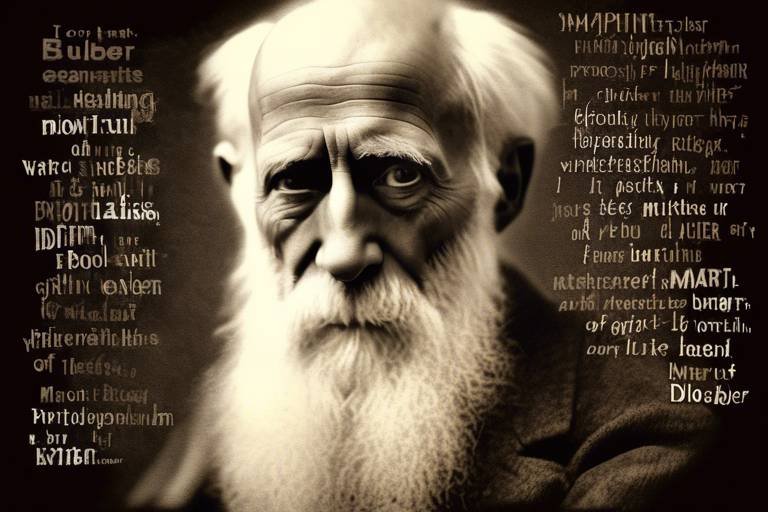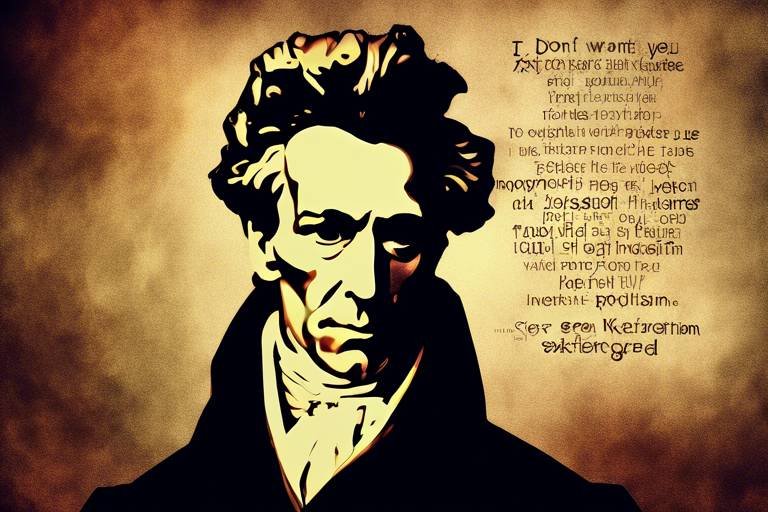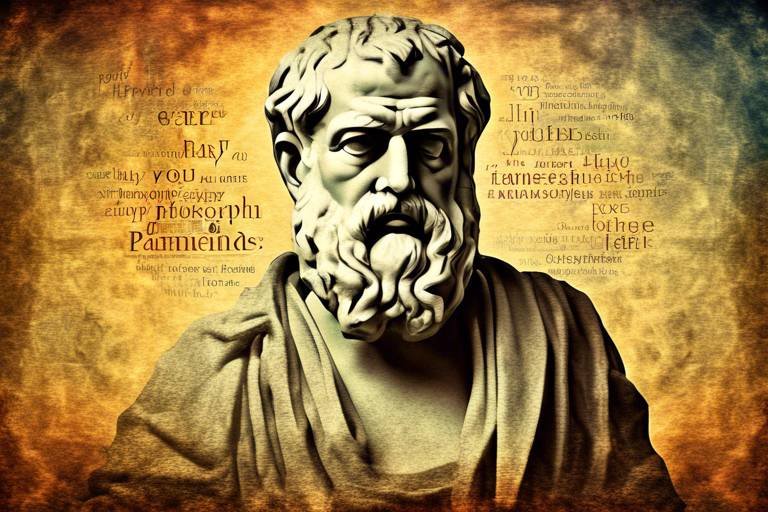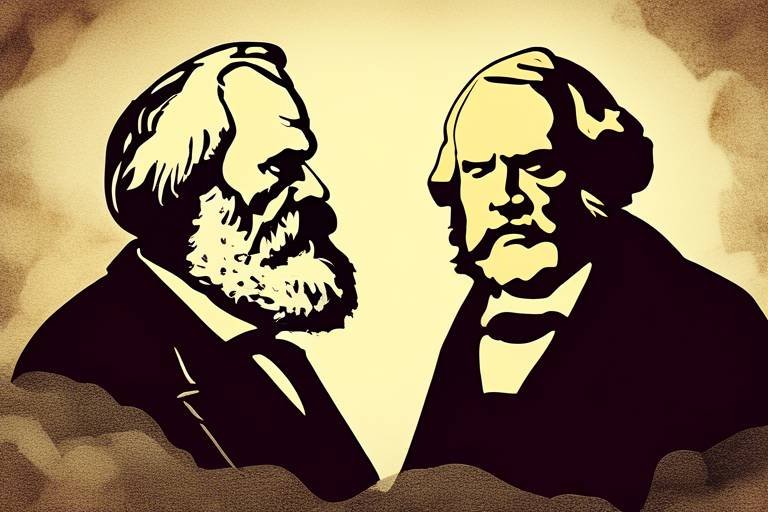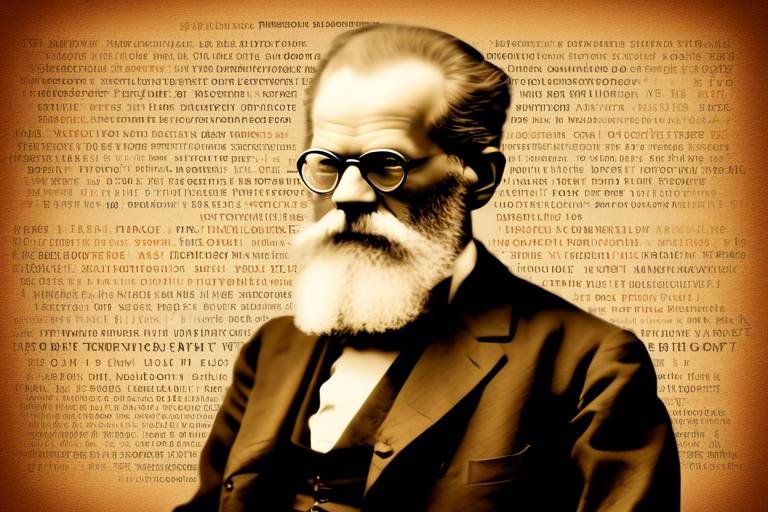The Intriguing Philosophy of Martin Buber and Dialogical Existentialism
Welcome to the fascinating world of Martin Buber, a philosopher who dared to challenge our understanding of existence through the lens of dialogue and relationships. Buber’s work, particularly his concept of dialogical existentialism, invites us to reconsider how we engage with one another and the world around us. At its core, Buber's philosophy asserts that our existence is not merely a solitary journey but a shared experience, enriched by the connections we forge with others. This article will delve into the profound implications of Buber's ideas, exploring how they resonate in our lives today and why they matter more than ever in an increasingly fragmented world.
Martin Buber was born in 1878 in Vienna, a city that was a melting pot of ideas and cultures. His upbringing in a Jewish family and exposure to various philosophical traditions laid the groundwork for his later thoughts. Influenced by existentialism, Jewish mysticism, and the philosophical ideas of Kant and Hegel, Buber developed a unique perspective on human relationships. His experiences during the tumultuous times of World War I and the rise of nationalism further shaped his thoughts on dialogue and existence. Buber believed that in a world rife with conflict, the act of engaging in genuine dialogue could bridge divides and foster understanding.
At the heart of Buber's philosophy lies the I-Thou relationship. This concept emphasizes the importance of genuine dialogue and connection between individuals. In contrast, the I-It relationship is characterized by objectification, where one person views another merely as a means to an end. To illustrate this, think of a conversation with a friend (I-Thou) versus a transaction with a cashier (I-It). The former is rich with meaning and connection, while the latter is often devoid of personal engagement.
Understanding the distinctions between the I-Thou and I-It relationships is crucial for grasping Buber's philosophy. The I-Thou relationship fosters an environment of mutual respect and understanding, where both parties are seen as whole beings with their own experiences and emotions. On the other hand, the I-It relationship reduces individuals to mere objects, stripping away their humanity. This distinction has profound implications for how we interact in our daily lives, influencing everything from personal relationships to societal structures.
When we engage in I-Thou relationships, we open ourselves up to deeper connections and a greater understanding of one another. These relationships are characterized by empathy, trust, and authenticity, allowing individuals to truly see and hear each other. In contrast, the I-It approach can lead to feelings of alienation and superficial interactions, where individuals feel disconnected and unheard. Recognizing the importance of nurturing I-Thou relationships can transform our personal lives and communities, fostering a more compassionate and connected society.
Buber's ideas are not just theoretical musings; they have practical applications in various contemporary contexts. In therapy, for instance, therapists who adopt a dialogical approach can create a safe space for clients to explore their feelings and experiences, leading to profound healing. In education, fostering I-Thou relationships between teachers and students can enhance learning and engagement. Moreover, community engagement initiatives that prioritize dialogue can build bridges between diverse groups, promoting understanding and collaboration.
Buber's notion of dialogical existence posits that meaning is derived from our relationships and dialogues with others. This perspective emphasizes the dynamic nature of human existence, suggesting that we are constantly shaped by our interactions. Just as a river flows and changes with each new drop of water, our identities and understandings evolve through our connections with others. This idea challenges the notion of a fixed self, inviting us to embrace the fluidity of our existence.
Buber's contributions to existentialism are significant, particularly in relation to themes of authenticity, freedom, and the search for meaning. His dialogical approach encourages individuals to seek authentic connections and to engage deeply with their own existence and that of others. This emphasis on dialogue and relationship has influenced various existentialist thinkers, expanding the discourse around human existence and the quest for meaning.
Many philosophers and theologians have drawn inspiration from Buber's work, recognizing the lasting impact of his dialogical approach. Figures such as Emmanuel Levinas and Paul Tillich have incorporated Buber's ideas into their own philosophies, demonstrating the relevance of his thought across diverse fields. Buber's emphasis on dialogue as a means of understanding the self and others has paved the way for new explorations of human relationships in philosophy, psychology, and theology.
Despite the profound insights offered by Buber, his philosophy is not without its critics. Some argue that his idealistic view of dialogue may be impractical in a world filled with conflict and misunderstanding. Others question the feasibility of achieving authentic I-Thou relationships in an increasingly transactional society. However, engaging with these critiques can deepen our understanding of Buber's work and its implications for contemporary discussions about existence and relationships.
- What is the main idea behind Buber's I-Thou relationship?
The I-Thou relationship emphasizes genuine dialogue and connection, viewing others as whole beings rather than objects.
- How can Buber's philosophy be applied in everyday life?
By fostering I-Thou relationships, individuals can create deeper connections and enhance their understanding of others, leading to more meaningful interactions.
- What impact did Buber have on existentialism?
Buber's ideas contributed significantly to existentialist thought, particularly in relation to authenticity, freedom, and the search for meaning in human life.

[Buber's Life and Influences]
Martin Buber, born on February 8, 1878, in Vienna, Austria, was a philosopher whose thoughts transcended the boundaries of traditional philosophy, intertwining with theology, psychology, and sociology. His early life was marked by a rich tapestry of cultural influences, as he grew up in a Jewish family that valued both religious tradition and intellectual inquiry. Buber's exposure to various philosophical currents, including existentialism and Jewish mysticism, profoundly shaped his worldview, leading him to explore the intricate dynamics of human relationships.
One of the most significant influences on Buber was his encounter with the works of Friedrich Nietzsche and Søren Kierkegaard. Nietzsche's exploration of individualism and existential angst resonated deeply with Buber, prompting him to consider the nature of existence beyond mere survival. Meanwhile, Kierkegaard's emphasis on personal experience and subjective truth encouraged Buber to delve into the personal dimensions of human relationships. This blend of existential thought and spiritual inquiry laid the groundwork for Buber's later ideas.
Another pivotal moment in Buber's life was his involvement in the Zionist movement. His commitment to Jewish identity and culture was not just a political stance but a profound expression of his belief in community and dialogue. Buber envisioned a society where individuals could engage in genuine relationships, fostering understanding and unity amidst diversity. This vision was vividly articulated in his seminal work, I and Thou, published in 1923, where he introduced the concept of the I-Thou relationship as a means to achieve authentic connection.
Buber's experiences during World War II further intensified his philosophical inquiries. The horrors of the Holocaust and the disintegration of human relationships during this tumultuous period prompted Buber to reflect on the fragility of existence. He recognized that in a world rife with conflict and alienation, the need for dialogue and mutual understanding was more critical than ever. His writings during this time emphasized the urgency of fostering relationships that transcend mere transactional interactions, advocating for a deeper engagement with others.
In summary, Martin Buber's life was a rich interplay of influences that shaped his philosophical outlook. His experiences and the intellectual currents of his time coalesced into a profound understanding of the importance of dialogue and relationships in human existence. As we delve deeper into Buber's philosophy, we will uncover the foundational concepts that continue to resonate in contemporary discussions about authenticity and interpersonal connections.

[The Concept of I-Thou]
Martin Buber's philosophy revolves around the profound distinction between two modes of relating to the world: the I-Thou and the I-It. At its core, the I-Thou relationship is about genuine connection and mutual respect between individuals. Imagine standing face-to-face with someone, where both of you are fully present, listening, and engaging in a meaningful exchange. This is the essence of the I-Thou relationship. Buber believed that in these moments of authentic dialogue, we transcend our individual selves and experience a deeper sense of existence.
In contrast, the I-It relationship is characterized by objectification. Here, the other person is not seen as a whole being but rather as an object to be used or observed. Think about it: how often do we find ourselves in conversations where we are merely going through the motions? We might nod along, but our minds are elsewhere, treating the other person as a means to an end. This transactional interaction can lead to feelings of alienation and superficiality, leaving both parties unfulfilled.
To delve deeper into Buber's philosophy, let's explore the implications of these two relationships. The I-Thou relationship encourages us to engage in meaningful dialogue that fosters understanding and empathy. It is in this space that we can truly see and hear one another, leading to a richer, more fulfilling existence. On the other hand, the I-It relationship diminishes our capacity for connection. It can create barriers that prevent us from fully experiencing life and the people around us. The distinction is not merely academic; it has real-world consequences for our relationships.
When we cultivate I-Thou relationships, we open ourselves up to deeper connections. This can transform our interactions with family, friends, and even strangers. For instance, in a family setting, approaching each other with an I-Thou mindset can lead to more meaningful conversations, fostering trust and understanding. Similarly, in professional environments, viewing colleagues as partners in dialogue rather than mere resources can enhance teamwork and creativity.
In today’s fast-paced world, Buber's insights are more relevant than ever. In therapeutic settings, for example, therapists who adopt an I-Thou approach create a safe space for clients to explore their emotions. This leads to healing and personal growth, as clients feel truly seen and heard. In education, teachers who engage with their students in an I-Thou manner can inspire deeper learning and curiosity. Such an approach encourages students to express themselves and feel valued in their educational journey.
Moreover, in community engagement, fostering I-Thou relationships can bridge divides and cultivate a sense of belonging. When individuals come together with the intent to understand each other, they create a supportive environment that nurtures collaboration and innovation. Buber's philosophy reminds us that our existence is inherently relational, and it is through dialogue that we can discover the richness of our shared human experience.
- What is the main difference between I-Thou and I-It?
The I-Thou relationship emphasizes genuine connection and mutual respect, while the I-It relationship focuses on objectification and transactional interactions. - How can I apply Buber's concepts in my daily life?
Focus on being present in conversations, actively listen, and engage with others as whole beings rather than objects. - Why are I-Thou relationships important?
They foster deeper connections, understanding, and a sense of belonging, enriching our human experience.

[I-Thou vs. I-It]
In the realm of Martin Buber's philosophy, the distinction between the I-Thou and I-It relationships serves as a cornerstone for understanding human interaction and existence. To put it simply, the I-Thou relationship embodies a deep, personal connection between individuals, where each participant recognizes the other as a whole being. It’s like standing face-to-face with a friend, sharing not just words but emotions, thoughts, and experiences. In contrast, the I-It relationship is more transactional and superficial, akin to viewing another person as a mere object or tool. Imagine seeing someone only as a means to an end, like a hammer used to drive a nail; this perspective strips away the essence of who they are.
When we dive deeper into these concepts, we can see how the I-Thou relationship fosters genuine dialogue and mutual respect. It encourages us to engage authentically, to listen and be listened to, creating a space where both parties can grow. On the flip side, the I-It relationship often leads to alienation. It’s the difference between enjoying a heartfelt conversation over coffee and scrolling through a social media feed, where interactions are often shallow and disconnected.
To illustrate this further, consider the following comparison:
| Aspect | I-Thou Relationship | I-It Relationship |
|---|---|---|
| Connection | Deep, personal | Superficial, transactional |
| Engagement | Authentic dialogue | Objectification |
| Emotional Depth | Mutual understanding | Lack of empathy |
| Outcome | Growth and connection | Isolation and alienation |
This table highlights how the two relationships operate in contrasting ways, emphasizing the importance of approaching others with a mindset that values their humanity. Buber argues that when we engage in I-Thou relationships, we are not just communicating; we are creating a shared space of existence where meaning and understanding can flourish. In contrast, the I-It perspective can lead to a sense of emptiness, where interactions lack substance and depth.
Ultimately, Buber's philosophy invites us to reflect on our daily interactions. Are we treating those around us as Thous, appreciating their full humanity, or are we slipping into the It mindset, reducing them to mere objects in our lives? This awareness can profoundly impact our relationships, encouraging us to cultivate connections that are rich, meaningful, and fulfilling.

[Implications for Relationships]
In the realm of human connections, Martin Buber's philosophy sheds light on the profound implications of the I-Thou relationship. This concept invites us to engage with others in a way that transcends mere interaction. When we embrace the I-Thou perspective, we cultivate a space where genuine dialogue flourishes, allowing for deeper understanding and empathy. Imagine a conversation where both parties are fully present, not just exchanging words but sharing their very selves. This is the essence of the I-Thou relationship—two individuals meeting as equals, acknowledging each other's unique existence.
On the flip side, the I-It relationship often leads to a sense of alienation. Here, individuals are reduced to mere objects, and interactions become transactional. Think about how often we engage in small talk with someone we barely know. In these moments, we might be more focused on the surface-level exchange rather than truly connecting. This superficiality can create a barrier to authentic relationships, leaving us feeling isolated even in a crowd. The implications are significant; when we prioritize the I-It approach, we risk losing the richness of human experience.
Furthermore, the impact of these relationships extends beyond individual interactions. In communities, the prevalence of I-Thou relationships can foster a sense of belonging and support. When people engage with one another as whole beings, they create a network of understanding that enriches the social fabric. Conversely, a community dominated by I-It relationships may struggle with fragmentation and disconnection. This highlights the necessity of cultivating environments where dialogue and authenticity are prioritized.
Consider the implications of Buber's philosophy in various contexts:
- Therapy: Therapists who adopt an I-Thou approach are likely to create a safe space for clients, fostering healing and personal growth.
- Education: Educators can enhance learning by treating students as partners in dialogue, encouraging critical thinking and collaboration.
- Community Engagement: Initiatives that promote I-Thou interactions can lead to stronger, more resilient communities.
Ultimately, the implications of Buber's ideas on relationships are profound. By striving for I-Thou connections, we not only enrich our own lives but also contribute to a more compassionate and understanding society. In a world that often feels fragmented, Buber's philosophy offers a roadmap towards deeper connections and a more meaningful existence.
- What is the difference between I-Thou and I-It relationships?
The I-Thou relationship is characterized by genuine dialogue and mutual respect, while the I-It relationship reduces individuals to objects, leading to superficial interactions. - How can I apply Buber's philosophy in my daily life?
You can apply Buber's philosophy by being fully present in your conversations, listening actively, and treating others as unique individuals rather than objects. - What are the benefits of fostering I-Thou relationships?
Fostering I-Thou relationships can lead to deeper understanding, empathy, and a sense of belonging, enhancing both personal and communal well-being.

[Applications in Modern Life]
In our fast-paced, technology-driven world, the teachings of Martin Buber resonate more than ever. His philosophy of dialogical existentialism offers profound insights that can be applied across various fields, enhancing our connections and understanding of one another. Whether in therapy, education, or community engagement, Buber's ideas can transform how we interact with others and perceive our own existence.
In the realm of therapy, Buber's concept of the I-Thou relationship encourages therapists to engage with their clients on a deeper level. Rather than merely treating symptoms or viewing clients as cases to be solved, therapists can foster a genuine connection that recognizes the client's humanity. This approach not only helps clients feel seen and heard but also facilitates a more meaningful therapeutic process. Imagine sitting across from someone who truly listens to your story; it can be transformative!
Similarly, in education, Buber's philosophy can revolutionize the teacher-student dynamic. Instead of viewing students as passive recipients of information (the I-It relationship), educators can create an environment where dialogue thrives. By engaging students in meaningful conversations, teachers can cultivate a sense of belonging and encourage critical thinking. This shift not only enhances learning but also nurtures students' emotional and social development. Picture a classroom where every voice matters—how empowering would that be?
Furthermore, Buber's ideas have significant implications for community engagement. In a world often marked by division and isolation, fostering I-Thou relationships within communities can bridge gaps and promote understanding. Initiatives that encourage dialogue among diverse groups can lead to more cohesive communities. For instance, community forums or interfaith dialogues can serve as platforms for individuals to share their experiences and perspectives, fostering a sense of unity and collective purpose.
To illustrate the practical applications of Buber's ideas, consider the following table that outlines how the I-Thou relationship can be integrated into different aspects of modern life:
| Field | Application of I-Thou |
|---|---|
| Therapy | Creating genuine connections that enhance the therapeutic process. |
| Education | Encouraging meaningful dialogue that fosters critical thinking and belonging. |
| Community Engagement | Building connections through dialogue to bridge divides and promote unity. |
| Workplace | Encouraging collaboration and understanding among colleagues. |
Ultimately, Buber's philosophy serves as a reminder that at the core of our existence lies the need for connection. In a world that often prioritizes efficiency over empathy, his teachings urge us to slow down and engage in authentic dialogue. By embracing the I-Thou relationship, we can enrich our lives and the lives of those around us, fostering a more compassionate and understanding society.
- What is the I-Thou relationship? The I-Thou relationship is a concept by Martin Buber that emphasizes genuine dialogue and connection between individuals, contrasting with the I-It relationship that objectifies others.
- How can Buber's philosophy be applied in therapy? In therapy, Buber's philosophy encourages therapists to engage with clients on a deeper level, fostering genuine connections that enhance the therapeutic process.
- Can Buber's ideas improve education? Yes, Buber's ideas can revolutionize education by promoting meaningful dialogue between teachers and students, creating an environment where every voice matters.
- What role does dialogue play in community engagement? Dialogue fosters understanding and connection in communities, bridging gaps and promoting unity among diverse groups.

[Dialogical Existence]
When we delve into the concept of dialogical existence as proposed by Martin Buber, we uncover a fascinating perspective on how we derive meaning from our interactions with others. Buber believed that our existence is not merely a solitary journey; rather, it is profoundly shaped by the relationships we cultivate. Imagine life as a vast tapestry, where each thread represents a connection with another person. The more threads we weave together, the richer and more vibrant our tapestry becomes. In this sense, dialogical existence is about recognizing that our understanding of self and the world is intricately linked to our dialogues with others.
Buber's philosophy posits that meaning arises through authentic dialogue, which he describes as a genuine exchange between individuals. This is not just about talking; it's about engaging deeply with one another, listening, and responding in a way that acknowledges the other person's existence and perspective. In a world increasingly dominated by technology and superficial interactions, Buber's ideas remind us of the profound impact of meaningful conversations. It's like the difference between a quick text message and a heartfelt conversation over coffee; the latter fosters a connection that can lead to deeper understanding and personal growth.
At the heart of dialogical existence is the recognition that we are not isolated beings. Instead, we exist in a web of relationships that shape our identity and experiences. Buber emphasizes that these relationships can be transformative. When we engage in authentic dialogue, we open ourselves up to new ideas, perspectives, and ways of being. This process is akin to a dance, where each partner influences the other's movements, creating a dynamic interplay that enriches both. It’s through these exchanges that we find not only ourselves but also a sense of belonging in the world.
Furthermore, Buber's dialogical existence challenges us to reconsider how we approach conflict and misunderstanding in our relationships. Rather than viewing disagreements as obstacles, he encourages us to see them as opportunities for growth. Engaging with another person's viewpoint, even when it contrasts sharply with our own, can lead to a deeper understanding of both the other and ourselves. This is where the magic happens—when we embrace the complexity of dialogue, we navigate the nuances of existence itself.
To illustrate this further, consider the implications of dialogical existence in various aspects of life:
- Therapy: In therapeutic settings, fostering an environment of open dialogue can lead to breakthroughs in understanding and healing.
- Education: In classrooms, encouraging students to engage in dialogue with one another can enhance critical thinking and empathy.
- Community Engagement: In communities, dialogical existence can bridge divides, fostering unity and collaboration among diverse groups.
In conclusion, Buber's concept of dialogical existence invites us to embrace the richness of our relationships. It challenges us to engage authentically with others and to view our interactions as opportunities for growth and understanding. By doing so, we not only enhance our own existence but also contribute to the tapestry of human experience, creating a world that is vibrant, interconnected, and full of meaning.

[Buber's Impact on Existentialism]
Martin Buber's philosophical contributions have left an indelible mark on the realm of existentialism, reshaping how we perceive authenticity, freedom, and the quest for meaning in our lives. His dialogical approach, which centers on the importance of relationships and genuine dialogue, provides a unique lens through which existentialist thought can be explored. Unlike traditional existentialism, which often emphasizes the solitary individual grappling with their existence, Buber introduces the idea that our very essence is intertwined with others. This perspective challenges the notion of the isolated self and opens up a dialogue about the interconnectedness of human experiences.
One of the key ways Buber influenced existentialism is through his concept of the I-Thou relationship. This relationship signifies a deep, authentic connection where individuals engage with each other as whole beings, rather than mere objects. In contrast, the I-It relationship reduces others to mere objects of use or analysis. This distinction is crucial for existentialists who seek to understand what it means to live authentically. Buber posits that true existence is only realized in the I-Thou moments, where one can encounter the other in their full humanity. This idea resonates with existentialist themes of authenticity and the search for meaning, as it underscores the importance of relationships in shaping our understanding of existence.
Furthermore, Buber's emphasis on dialogue aligns with existentialist views on freedom. He argues that freedom is not merely the absence of constraints but is deeply rooted in our relationships with others. In Buber's view, we achieve true freedom when we engage in meaningful dialogue, allowing us to break free from the confines of objectification and superficial interactions. This notion challenges existentialists to reconsider the role of others in their search for personal freedom and self-definition.
To illustrate Buber's impact, consider how his ideas have influenced various existentialist thinkers. For example, existentialists like Jean-Paul Sartre and Simone de Beauvoir, while focusing on individual freedom and responsibility, also acknowledge the significance of interpersonal relationships. Buber's dialogical approach provides a foundation for understanding how relationships can enrich or hinder one's quest for authenticity and meaning. His work encourages a more relational perspective in existential discussions, prompting thinkers to explore how our connections with others shape our existence.
In addition to his philosophical contributions, Buber's ideas have found resonance in various fields, including psychology, education, and theology. His dialogical principles have been applied in therapeutic settings, where the therapeutic relationship is viewed as a space for genuine dialogue and mutual understanding. In education, Buber's emphasis on relationships fosters an environment where students and teachers engage as partners in learning, promoting a deeper understanding of the material and each other.
Ultimately, Buber's impact on existentialism is profound and multifaceted. His insistence on the importance of dialogue and relationships challenges us to rethink our approach to existence. By recognizing that our lives are interwoven with the lives of others, we can cultivate a richer understanding of what it means to be human. In a world that often emphasizes individualism, Buber's philosophy serves as a reminder that our connections with others are not just peripheral but are central to our existence and the search for meaning.
- What is the main idea behind Buber's philosophy? Buber's philosophy emphasizes the importance of genuine relationships and dialogue, particularly through the concepts of I-Thou and I-It.
- How does Buber's work relate to existentialism? Buber's ideas challenge traditional existentialism by highlighting the interconnectedness of human existence and the role of relationships in finding meaning.
- Can Buber's concepts be applied in modern contexts? Yes, Buber's principles are applicable in therapy, education, and community engagement, enhancing interpersonal connections.
- What distinguishes the I-Thou relationship from the I-It relationship? The I-Thou relationship involves genuine connection and dialogue, while the I-It relationship is characterized by objectification and superficiality.

[Influence on Later Thinkers]
Martin Buber's philosophical contributions have left a profound mark on various fields, influencing a multitude of thinkers across disciplines. His concept of dialogical existence, primarily articulated through the I-Thou relationship, has resonated deeply with existentialists, theologians, and psychologists alike. The essence of Buber's thought encourages a shift from viewing others as mere objects (I-It) to recognizing them as partners in dialogue (I-Thou), fostering a more authentic engagement with the world.
One notable figure influenced by Buber is the existentialist philosopher Jean-Paul Sartre. While Sartre's focus on individual freedom and responsibility might seem at odds with Buber's emphasis on relationality, the two share a common ground in exploring the nature of existence. Sartre's idea that "existence precedes essence" aligns with Buber's assertion that meaning is derived through relationships rather than isolated introspection. Both thinkers challenge us to confront our existence and the significance of our connections with others.
The impact of Buber's thought extends to the realm of psychology, particularly in the work of Carl Rogers. Rogers, a pioneer of humanistic psychology, emphasized the importance of genuine relationships in therapeutic settings. His person-centered approach echoes Buber's dialogical philosophy, as both advocate for empathy, openness, and authenticity in interactions. Rogers believed that creating a safe space for dialogue could facilitate personal growth and healing—principles that are firmly rooted in Buber's ideas.
In the field of theology, Buber's influence is evident in the works of Abraham Joshua Heschel, who integrated Buber's concepts into Jewish thought. Heschel's emphasis on the relational aspect of God and humanity mirrors Buber's insistence on the significance of dialogue. For Heschel, prayer and understanding are not merely individual experiences but relational acts that connect us with the divine and each other. This perspective enriches the spiritual discourse, highlighting the importance of community and dialogue in religious practice.
Moreover, contemporary thinkers such as Emmanuel Levinas have built upon Buber's ideas, particularly the ethical implications of the I-Thou relationship. Levinas posits that our primary ethical obligation is to the Other, emphasizing responsibility and the face-to-face encounter. This notion resonates with Buber's philosophy, reinforcing the idea that our interactions shape our understanding of existence and morality.
In summary, the ripple effects of Martin Buber's philosophy can be seen across a diverse range of thinkers and disciplines. His emphasis on dialogue and relationality has not only enriched existentialist thought but has also provided a framework for understanding human relationships in psychology and theology. As we continue to grapple with the complexities of existence, Buber's insights remain a guiding light, reminding us of the power of authentic engagement in shaping our lives and the world around us.
- What is the I-Thou relationship? The I-Thou relationship, as described by Buber, emphasizes genuine dialogue and connection between individuals, contrasting with the I-It relationship, which focuses on objectification.
- How did Buber influence psychology? Buber's concepts influenced humanistic psychologists like Carl Rogers, who emphasized the importance of authentic relationships in therapy.
- What is dialogical existence? Dialogical existence refers to the idea that meaning and understanding arise from our relationships and dialogues with others.
- Who are some other thinkers influenced by Buber? Notable figures include Jean-Paul Sartre, Abraham Joshua Heschel, and Emmanuel Levinas, each of whom integrated Buber's ideas into their work.

[Critiques of Buber's Philosophy]
While Martin Buber's philosophy of dialogical existentialism has garnered significant admiration, it is not without its critiques. Some philosophers and scholars argue that Buber's emphasis on interpersonal relationships may overlook the complexities of individual identity. Critics contend that his focus on the I-Thou relationship, while profound, can lead to an idealistic view of human interaction that may not hold up in the face of societal pressures and conflicts.
One major critique centers around the notion that Buber's philosophy is overly optimistic. Detractors argue that the I-Thou relationship, which promotes genuine connection, is often difficult to achieve in reality. In a world where technology and social media increasingly mediate our interactions, the depth of the I-Thou connection may be challenging to realize. Critics suggest that Buber's framework does not adequately account for the alienation and superficiality that can arise in modern communication.
Moreover, some philosophers have pointed out that Buber's binary distinction between I-Thou and I-It relationships may oversimplify the complexity of human interactions. Life is rarely black and white; many relationships exist in a gray area where elements of both I-Thou and I-It coexist. This complexity raises questions about the practicality of applying Buber's concepts universally. Can we genuinely categorize our relationships so distinctly, or do they often blur together?
Another area of critique focuses on the philosophical implications of Buber's ideas. Some argue that his dialogical approach may inadvertently diminish the importance of the self in existential thought. By prioritizing relationships, there is a concern that Buber's philosophy might neglect the individual's quest for self-understanding and authenticity. In a world where personal identity is paramount, this aspect raises significant questions about the balance between self and other.
Additionally, Buber's religious background and the spiritual dimensions of his philosophy have led to debates about the secular applicability of his ideas. Critics argue that the spiritual underpinnings of Buber's thought may alienate those who seek a more secular understanding of human existence. This raises an important question: can Buber's philosophy be effectively utilized in diverse cultural and philosophical contexts, or is it inherently tied to his Jewish existentialism?
Lastly, some contemporary thinkers have raised concerns about the feasibility of Buber's ideals in practical settings. In fields like therapy, education, and community engagement, while the I-Thou relationship is desirable, the realities of institutional constraints and power dynamics can complicate its application. How can one foster genuine dialogue in environments that often prioritize efficiency and productivity over meaningful connection?
In conclusion, while Martin Buber's philosophy offers a rich framework for understanding human existence through dialogue and relationships, it is essential to engage with the critiques it faces. By examining these criticisms, we can better appreciate the nuances of Buber's ideas and explore how they can be adapted to address the complexities of modern life.
- What is the main idea behind Buber's I-Thou relationship?
The I-Thou relationship emphasizes genuine, mutual connection between individuals, contrasting sharply with the I-It relationship, which is more transactional and objectifying.
- How can Buber's philosophy be applied in modern therapy?
Therapists can utilize the principles of the I-Thou relationship to foster deeper connections with clients, promoting an environment of trust and authenticity.
- Are Buber's ideas relevant in today's digital age?
While Buber's concepts may face challenges in the digital landscape, they can still inspire individuals to seek more meaningful interactions amidst the superficiality of online communication.
Frequently Asked Questions
- Who was Martin Buber?
Martin Buber was an Austrian-born Jewish philosopher best known for his work in existential philosophy and theology. His ideas focus on the nature of human relationships and the importance of dialogue in understanding existence.
- What is the I-Thou relationship?
The I-Thou relationship is a key concept in Buber's philosophy that emphasizes genuine connection and dialogue between individuals. It contrasts with the I-It relationship, which is more about objectification and superficial interactions.
- How does Buber's philosophy apply to modern life?
Buber's concepts can be applied in various contemporary contexts, such as therapy, education, and community engagement. His ideas encourage deeper interpersonal connections and promote meaningful dialogues, enhancing overall human interaction.
- What is dialogical existence?
Dialogical existence refers to Buber's belief that meaning is derived from relationships and dialogue. He posits that our existence is dynamic and shaped through our interactions with others, emphasizing the importance of communication in finding purpose.
- How did Buber influence existentialism?
Buber's ideas contributed significantly to existentialist thought, particularly regarding authenticity, freedom, and the quest for meaning. His emphasis on dialogue and relationships added a unique dimension to existential philosophy.
- What critiques exist regarding Buber's philosophy?
While Buber's work has been influential, some critiques focus on the practicality of his ideas in contemporary discussions. Critics argue that his concepts may be too idealistic or challenging to implement in a fast-paced, modern world.
- Can Buber's ideas help in personal relationships?
Absolutely! Buber's emphasis on the I-Thou relationship encourages individuals to engage in deeper, more meaningful interactions, fostering understanding and connection in personal relationships.

